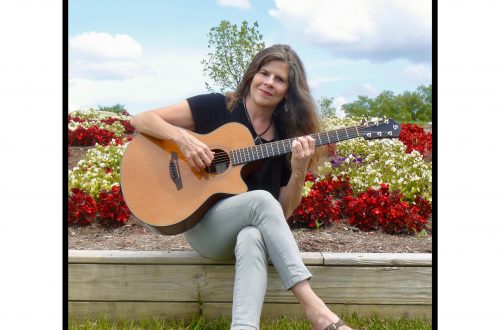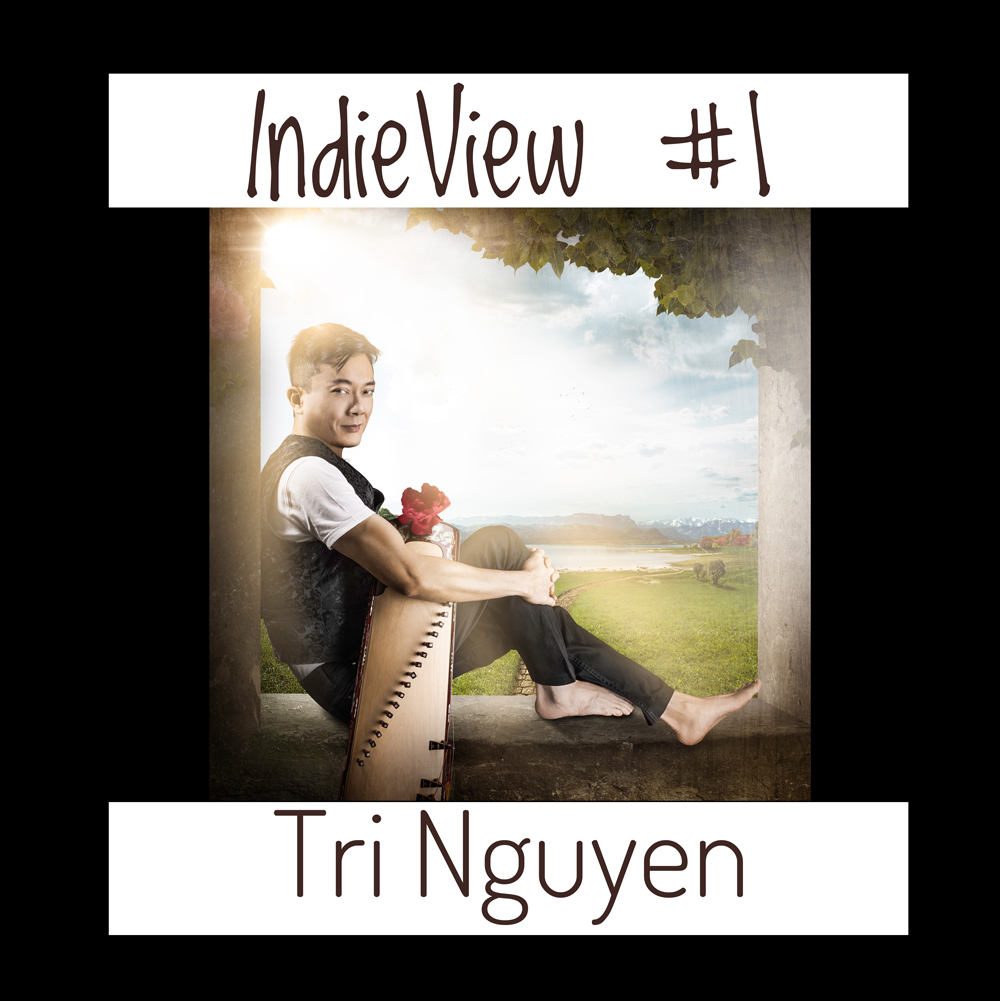
Tri Nguyen – IndieView #1
I met Tri and his music during the 60th Grammy Awards while we were both in ballot for the nominations.
From the very beginning, I was charmed by his way of composing and by the highly interesting use he does of his Zither, by mixing the sound of his culture with classical music.
I have admired the great attention and cure that he pays to his projects and I discovered some musical
affinities, even though our paths and instruments are very different.
Today I would like to introduce him to you.
Tri Nguyen
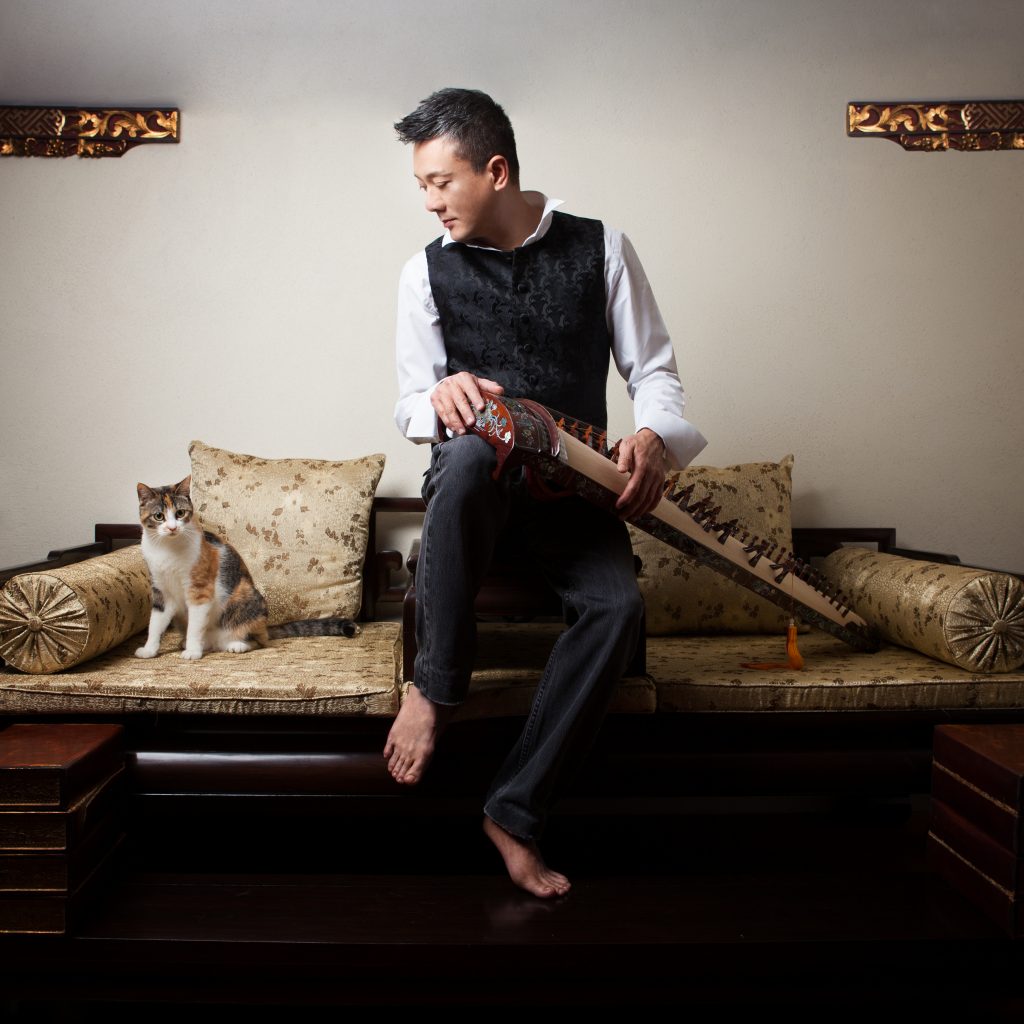
He was born in Saigon, Vietnam, but he has been long living in Paris, France, where he has produced 3
albums:
Consonnances published in 2014 which won the Akademia Music Awards and a Gold Medal at Global Music Awards.
The EP Journey Between Worlds released in 2016:
And his latest the album that got me in touch with him, Beyond Borders published in 2017 which won theGold Medal at Global Music Awards, recently nominated at the 16th Independent Music Awards” and in consideration at the 60th Grammy Awards
ABOUT YOU
If we cast your mind back to when you were a kid and a teenager: what are your earliest musical memories?
I was 5 years old : my first steps on the piano with my first music teacher. I began rather early for a kid of my age. The reason was that I was left handed, but then broke my left arm at the age of 4. Being forced to do things with my right hand led to problems with speech, orientation etc. My parents decided to put me on the piano a few months after they removed the cast from my arm. The independance between left and right hands that piano playing required solved all my problems.
They discovered I was gifted for music, and in order to maintain traditions in addition to our opening to western cultures, my parents sent me to an old zither master, the last of his kind, when I was 7. These were unforgettable moments, a master/disciple relationship immediately wove between us. He was very demanding and strict, and often scolded me, but I adored this old scholar and musician. When he died, all his students gathered before his coffin to play for the last time. I still vividly have these memories in my head, a moment of intense emotions, sadness mingled with eternal gratitude. Some fellow students told me afterwards that Master considered me to be his best disciple, the reason why he was so strict with me. I wept hearing this.
My parents were very proud of my musical abilities, and often “bragged” me around. They often demanded that I play the piano or the zither when guests came to our house. My father died when I was a teenager, but I’m grateful that he was able to see how far I had gone in music and make him proud.
Which was the first album you ever bought?
Super Trouper by the ABBA!! lol. We had tons and tons of Deutsche Grammaphon vinyls at home, but no “pop”‘ recordings … so this is what I first bought for myself!
Which musicians do you particularly admire and which one do you think influenced your music?
I think it’s a mixture of all these talents that influence my conception in making music : openness to all kinds of music, but knowing where I go and having my own identity.
Which is the best concert that you have been to?
Funny, but it was with a Chinese cellist peforming the Rococo Variations at the Beijing Grand Opera a few years ago (2012 I think). Can’t even remember his name, but I was struck by the authenticity and honesty of his playing. Made my cry.
What does music mean to you?
Every single existing emotion on earth, generosity, humility, openness. Music is Life, it brings peace to the soul, to mankind.
Music is my life.
Are you still in love with your profession as musician? How do you keep your enthusiasm always live?
Haha! More and more!!! There are ups and downs. Sometimes, when the work is SO intense and exhausting, when the pressure is really hard, I say to myself that being a fruit vendor, a pharmacist, a hair dresser would be so much simpler. But I think it’s like a drug, you just can’t do anything else besides playing and composing music. I then say to myself that I’m a lucky guy, and that not that many people out there have the chance to choose a job they like. I’m conscious of this priviledge.
Usually, in the middle fo the night, I wake up with new ideas for my music, I get up, note down the ideas on my smartphone and go back to bed. Putting those ideas on scores and recordings is such bliss. But then SHARING that music to others, performing on stage or talking about music to audiences is expremely exciting and rewarding. Making music is very important, but you have to share that music, not keep it to yourself. That’s what I try to do to my very best.
In addition to composition and performing, teaching is also what I really cherish. It’s another form of sharing, of giving out. Some musicians do not like teaching. I’m lucky I love this, it makes you humble.
When did you decide to be a full time musician?
When I was about 18. I wasn’t that easy. My family is a very traditional family. Being an excellent musician is one thing, to make music your bread and butter is another. But I made it, and am grateful to the Heavens for that.
Even if being a musician is what I do for a living, I always say to myself that I should never take this for granted. I have to learn more, look out there even further. Some musicians I know lose their passion and just become “I go out there to perform just to feed myself” musicians. This would be horrible for me.
How do you manage your music life with your “common” life? What is your typical day like?
Typical day ? I get up quite late, around 11:00 am (except when I’m on tour, I have to get up much earlier), tend to my cats, empty their litter, give them their nuggets, take my shower, have lunch (too late for breakfast!), look at my emails, practise my piano, then the zither. Then comes all the social media stuff (we’re in the 21st century, this is part of a musician’s life!). Off to the gym 2 or 3 times a week. Before dinner howewer, feeding my cats again, this time they have their canned cat food. I love to cook, so spend an hour or two cooking dinner for myself. After dinner, comes composing time, I always write music at nightime, this could be last till 2/3:00 am, then I eat again, go to bed, watch a TV series on Netflix, then fall asleep!
Teaching is also important. I teach about 3 days a week.
Sometimes I change the order of how I do things, there are other errands to do, but this roughly my typical day!
Tell us more about your latest works (album, live tour, new projects).
I’m starting 2 more compositions, still in their structure form. I like to take my time.
After the Grammy campaign, many musicians have invited me to collaborate with them. They had never heard of the zither before and just fell in love with its sound listening to Beyond Borders.
I’m so honored.
This is what I really like, discovering new universes in music, getting to collaborate with other musicians, learning and sharing.
When I was in Vietnam in October, VTC10, a Vietnamese TV channel, proposed to do a documentary on me, nothing special, I like my relationship with the press, but this is the first time that my mother is present in a story about me as an artist. I was extremely moved during the week when they followed me on film.
Let’s chat about music studies.
Are you self-taught or have you studied music? You think is important studying music to be a Pro?
It all depends on what kind of music one is in as a pro. Some musicians have never been to a music school in their lives and are doing fine. In my opinion, and in my case, I think having a solid background in music, technique and theory, is important. It helps me understand what I do, and it enables me to grasp what others do more easily.
Did you keep on studying?
Speaking of culture, which is the last book that you read?
It’s a profound question about the book, being myself Vietnamese living in France/Europe.
For Christmas, I got a present from a cousin, a book about an Asian family in the US. Maybe a topic which could be “trendy” with the current situation in America.
It’s titled “Everything I Never Told You” by Celeste NG.
The book I received is a French translation : “Tout Ce Qu’on Ne S’est Jamais Dit“hat tells the story of a Chinese immigrant married to a white Amercican woman. Their “mixed raced” daughter Lydia was found drowned in a lake… Then revelations of the daughter’s life came to the surface, and questions were posed as to the position of foreigners in a Western land, however their will to be part of the local society.I’m extremely sensitive whenever I watch movies, read a book. I’m the first to shed tears when heartfelt scenes are on the silver screen, or have my heart racing when reading a book I can relate to. I sometimes shed a tear on stage when the connection with the public is so intense I can hardly hold back my emotions.
“Everything I Never Told You” put me in a position of questionning myself as to my origins in a foreign land. My status as an artists kind of gives me a “different” position in the eyes of the “Western” people; but when people do not know what I do, their attitude somehow is different.
“Everything I never Told You” sent me back to one of these moments when I feel a certain “reluctance” from people I barely know in everyday life, but being a musician pushes me to go “beyond borders and bounderies” and reach out to others.
It’s a beautiful book.
While you are on the road did you find the time to improve your technical skills on your instrument? Do you think is it important?
Album Production
Can you describe the process you go through when you are writing a song? What inspires you to write?
When it’s a melody from the ancestral repertoire of Vietnam, I choose the melody and try to make it “my” life. The emotions I feel are important in the process. I have to make it part of myself. Then I pose the harmonies, then go through the structure, then the technical aspects of the instrument(s). I then try to imagine what it sounds like once played, then try to put it on score. But I go back and forth to make alterations and impovements. I like to take my time.
The most important thing is what emotions I have listening to these notes, and imagine what emotions listeners can have. It’s like writing a story, I try my best to tell a story – to myself and to others – with notes. People who “hear” the story may have their own individual emotions and feelings. The most important thing of all is to FEEL what I write; and invite others to FEEL, whatever their emotions are. Emotions change with different people, but as long as the emotions are there, as long as it tells a story, those are the most imortant things. I love to tell stories, and if I can do it through music, it’s a blessing.
“In Zither Master Tri Nguyen, Vietnam has a fine ambassador …” Songlines – UK
Album/Ep/Singles any favorite way to release your music? and why?
How do you plan an album production and his release?
Gosh, that’s a huge question. I like to have things done properly, and with the utmost care and as artful as possible. It all depends whom I’ll be working with, and how many musicians are invovled. First ideas for pieces and the stories behind have to be ready in my head. ideas I pick from everyday life, seeing a landscape, people in the street, reading a story, listening to any kind of music, thinking of my motherland, my parents …
For my first album, Consonnances, all the pieces were ready when I found the right musicians to work with. But for Beyond Borders, since I had to merge into their respective universes, the structure of the album first began in my brain, but then I had to go hunting for the musicians, discuss about their musical world and mine, then from there start to compose. Some alterations can occur during this process, since I sometimes have new ideas as rehearsals or discusssions with the other musicians move on.
Besides sound, storytelling and visuals are extremely important to my eyes. So the concept of the album has to be clear, the story it tells coherent. Then the booklet has to be easy to understand, the story or message it carries has to be easy to read but at the same time filled with beauty. Comes the visual, something that relates to me, but that people who look at it will appreciate.
The financial part, calculating the costs, the expenses.
Once I have everything in place, recording at the studio. Everybody has to be ultra ready to reduce takes (and studio time) during the recording sessions. However, we only stop when I feel that there are enough good takes for editing and mixing, mastering. For Beyond Borders given the quantity of musicians involved, it took me 6 months to have all the tracks ready. I had worked 9 months on the album.
Contacting the photograph to get the visual in place, discussing about the exact visual I want for the album. Photo sessions, choices, photo editing, I like to follow each step.
Contacting the distributor to discuss about the release period, getting in touch with CD makers and printers etc. etc. etc.
This is summary of what I do, but it could more exhausting and mind wrecking!
But in the end, the satisfaction, the pride I can have holding the CD in my hand, celebrating all this with my fellow musicians, all this is just beyond words.
Forgot to mention, before the Cd comes out, all pieces have to be registered at PRO or CCO (SACEM for France).
When you release an album how much is important for you the tracklist? And the time between the tracks?
I like to leave about 3 seconds between each tracks, so the listener can have time to “breathe” and discover the following track.
Do you produce your records by yourself or do you prefer to have some extra ears or a producer to guide you?
When I work in recordings with other productions that are not mine, we work as a team, but the producer has the final word and I follow her/his decisions.
Mutual respect and understanding is essential. A connection between musicians is vital, but it’s extremely important that each musician (me included) knows where she/he stands, it makes things so much easier and avoids “chaotic” situations.
Did you record your music in a rented professional studio, home studio or in any other way?
Funny anecdotes, in Beyond Borders, part of some tracks were recorded 10 000 kms from Paris and mixed afterwards! I worked with the musicians through Viber!! It took me about 3 months to get things done, but it was so much fun.
How did you choose the musicians for your album?
Facebook is full of surpises too. I get to know so many talented people and some of them have become really good friends, some of which I’ve never met yet! Many collaborations are on the way and I’m really excited.
Did you mix and master your album/tracks in different ways for digital and physical releases?
Album Promotion
Are your records only digital or also physically distributed?
What types of promotion and marketing have you found to work best for an independent artist?
On the other hand, touring is a very good way to sell your music too, and I love this part. You sell a lot of physicals after concerts, and I love to play in front of a crowd, who doesn’t?
There are some music industry analysts who argue that the CD is dying. What percentage of your sales are physical CDs and what percentage of your sales are in other forms (e.g. online)? Do you see that changing significantly in the future?
There’s a trend coming back to vinyls and cassettes, but these sales are ridiculous compared to CD sales in the past.
Just to give an example: people downloaded a lot Consonnances when it was released in 2014, in 2017, when I released Beyond Borders, I can see the difference!
On the other hand, after a live concert, a conference, direct physical sales are fabulous, and downloads jump up for a few days.
Streaming killed the music industry. Why should people pay 15/20 $ for a physcial, 10$ for an album donwload, when for 10$/month they can get 60 million tracks?
Physical albums are like “couture dresses”. No one buys couture dresses nowdays, but houses like Dior or Chanel have to come up with couture fashion shows twice a year. It’s THE window for these houses. Same thing for artists. We have to come up with physical CDs even though nobody buys them anymore.
ONE thing for sure though, I DO sell a lot of CDs after a live show, people need to see the artists nowdays, they need your autograph on the booklet, they need to touch the artist in the flesh.
I discussed about physical CDs with some musician friends in the US the other day. They clam that their next albums will be solely digital, NO physicals. perhaps they are right?
How do you normally promote your latest releases? Do you use only social networks or also other ways?
I use social networks. It depends on where too. In the Western world it’s very expensive to have the press talk about your release, I contacted a few, and have had very positive reviews in return, but it’s not enough. In Vietnam, it’s still an emerging country, so the press just jumps at you. I have about 50 articles each time. However, this is only local, not international, alas.
Do you use Facebook/twitter/instagram sponsored post for promotion? You think could be they helpful?
However, as I said, people don’t BUY or download anymore. The best way to advertise for one’s music nowadays is through live shows. I’ll have to work more on that too.
“Tri Nguyen is a magician who combines worldliness with skilled musicianship.” 24OurMusic – Canada
Have you a mailing list? You think is a “must have” as most people in music business said?
The problem is to get more subscribers to your newsletters. When I look at the analytics, only 30% of the people you send newsletters to open them. The world is OVERWHELMED with media, news, textos, emails, social networks. IMHO, in order to stand out, one has to do something apart. I’m lucky the Vietmamese zither is almost unknown to the world, it’s something “new”. Only academics and specialists know what it is. Reason why I have only released records with the zither and not the piano.
I’ll start a series of short videos on Youtube to talk about the Vietnamese Zither starting February. People don’t know what this instrument is, and I’m one of the few to play it. They often confuse it with the Chinese Guzheng or the Japanese Koto. It will also be an opportunity to promote my ancestral heritage but in a modern way.
Have you a favorite way to distribute your album?
Do you think that, with all the digital alternatives, radio airplay still has an effect on the success of a release? And how does an independent artist get radio airplay?
I’ve been on a few internet radio stations, no results.
Problem is HOW to get on a mainstream radio. They are overwhelmed with music releases nowadays and only pay attention to music released by major labels. Same thing happened this year with the Grammys. ONLY major labels were nominated, sprinkled with a few Indies…
Will have to think about this.
What do you think about streaming services like Spotify and Pandora?
Follow our Spotify Playlist:
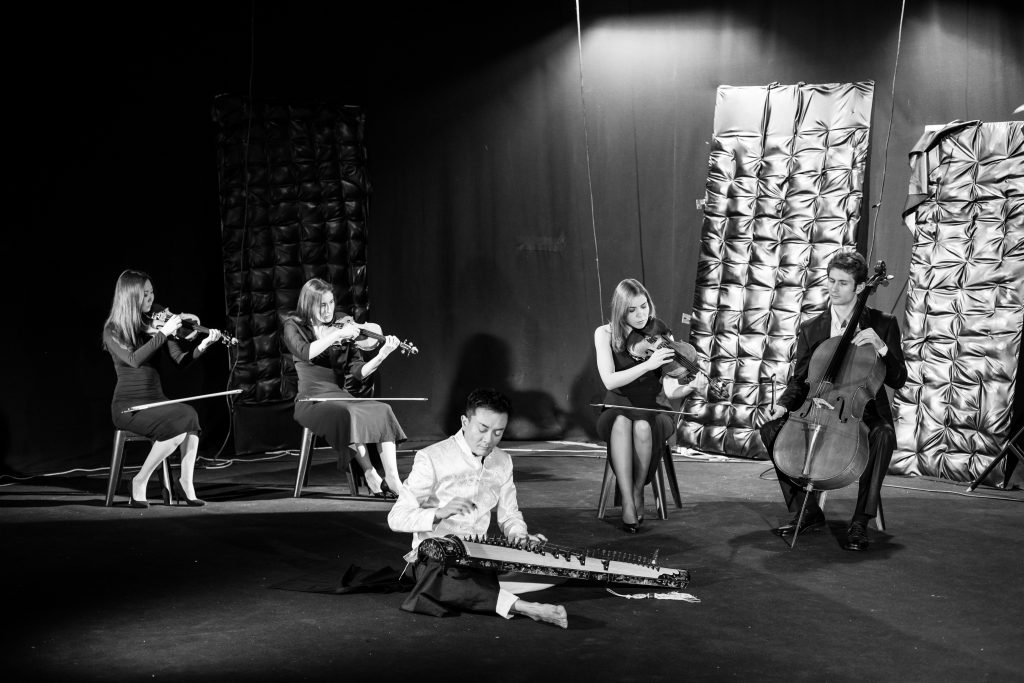
Live Music
Did you work with booking agencies or you manage your own gigs?
Depends where I am again. In Vietnam I have an agent we’re doing fine.
In the UK, I have an agency but they’re not good.
In France I was a DIY guy, but I think it’s time I get an agent or a manager.
I have an eye on the rest of the Asia market. People say it’s the future.
Organizing a tour could be really expensive especially if you travel with a band far away from your country, how do you manage everything to earn and don’t loose money?
If we’re more, I’ve found a terrific way to cut down costs: I play with local musicians. I send them scores + audio of my music in advance, verify through Viber or Skype that all is in place and that they have practised their parts, then when I get to the specific country, we only have to rehearse a day or two before the tour. The condition is that these musicians have to be serious and that you can count on them to be 100% ready.
Backing tracks are a solution but I don’t like it, and it’s not good for the image. But it could work if you’re playing in a club and not a big venue.
Somebody says that House Concert are the future of live music as many club are closing. What do you think about it? Have you organized any?
Maybe I’m wrong. I can always change my mind!
Do you have any suggestions for somebody who would host an house concert?
Concert first, then drinks and finger food so the artist and the public can get to socialize afterwards.
Every time you play your music you are giving a big part of you to your crowd, do you feel tension before a concert? If yes how do you manage it?
Gosh, I’m a stage fright guy. I think it stays for life. And I need it. Sarah Bernhardt once said : “Stage fright comes with talent.” Well said huh?
But over the years, I’ve learned to control that stage fright better. It’s good when you surround yourself with people you go along well with. And you really have to be ready for the show. Practise, practise, practise.
I visualize how the show goes on before stepping on stage, seeing the crowd, playing the first notes etc. Again, when you’re surrounded by musicians you really get along with, it’s perfect. This is very important for me.
In any case, I LOVE being on stage, and with all the stage fright, when you feel a connection with the crowd, it’s heaven.
Which is the difference between a big audience or a small one?
Performing in front of 1000 people who don’t pay attention to you music is not the same thing as performing in front of 50 people who are there to listen to every note. Whatever the case, every single performance has its importance.
And it all depends on the connection one can get with the audience. I always try my best to get THAT connection, were it to be in front of 50 people or 1000. It’s of the utmost importance.
Each of us has some expectations before a show, which are yours? What would you love to “have back” during a concert or what you already receive?
I love playing before a public who has never heard of my music before, who doesn’t even know what the Vietnmaese Zither is, but then during the show, I can feel that connection, the intense emotions as I plug each note, and the excitement at the end onf the show where they tell me what a wonderful discovery it was for them.Even when i’m on the piano, I’ve played in front of people who had never listened to classical music before, and to hear say that from then on, they would find out more about classical music, is just a blessing.
An artists makes and plays music for himself, but he does it also for the crowd, and has to share that music to get the love he gets in return.
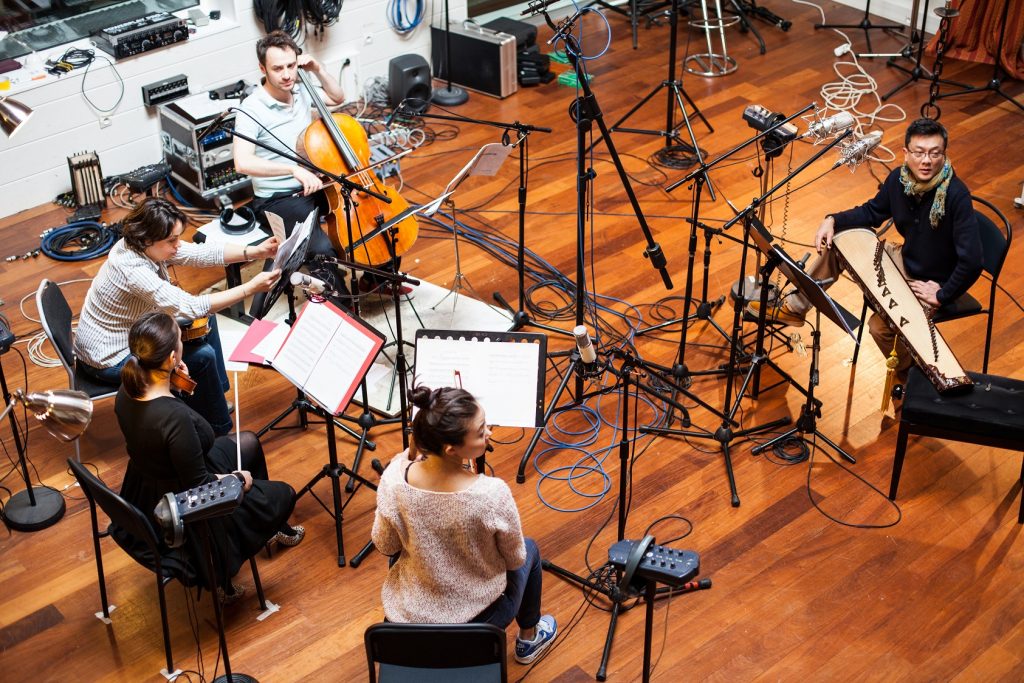
Music Business
Have you a daily business routine? Checking/writing E-mail, phone calls, create new connections?
Which percentage of your time is dedicated to: “Creating Music”, “Promotion”, “Organizing gigs/tour”, “Studying”, “Reading”, “Listening Music”
Do you think that the Artist status is compatible with the entrepreneurship? Do you think that an Indie artist needs to be also an Entrepreneur?
Entrepeneurship does not mean one has to do everything oneself, but one has to know how to share the work that has to be done. If everybody takes responsability, nothing is impossible. Unfortunately, musicians in France tend to become lazy and irresponsable .. but it’s another story.
As an artist, which are the biggest differences between being represented by a major label or being representing by yourself?
I’ve never signed with a majot label myself, but from what I see and hear, when you’re with a major label, you loose some of your independance. Independance to make decisions about your music, independance to choose your video clips, your look, your visuals etc.
On the other hand, having a major label behind you will ease you of all the administration or social stuff you have to do everyday. And you can concentrate on you music and not worry about everything.
It’s a balance of things.
I wouldn’t say that I’m against signing with a major label, I’ll just have to know where I go, when I should yield and when I should stand my ground. You just can’t have it all in life, making the right choices is what’s important.
Which PRO (Performing Rights Organization) are you affiliate with and why did you choose that?
As a full time musician I immediately realized that I can’t only work as musician and I should extend my expertise in different fields. So, I became a Sound Engineer, composer, producer too. Did you also develop different fields? Which one? What do you like and do not like about each one?
Same here. Even though I’m not a sound engineer, I know exactly what I want to hear when everything is recorded, edited, mixed, mastered. Having people around to advise me is also very important.
One field that I think is extremely important is the “human management”. When I’m working on a project that’s mine, I have to know how to choose people I work with. Handling human emotions, sensibilities, capacities or flaws is not simple. I have to know how to get the best of everyone and work with them in the best conditions possible. It was quite hard at the beginning, but you grow with time. I’m doing better as time goes by.
Visuals are important nowadays too. So working with video makers or photographers requires knowledge in the field. Musician skills help when it comes to the rhythm of a video for example. Since I paint a lot, the balance of colors and frame come in handy.
Writing is part of the work. Booklets and album notes are very important. So I have to develop that part too. It’s rather exhausting when yo have to write in 3 languages, but once the draft is done, I get people to help me proofread everything. Booklets in all 3 CDs were written by myself, telling a story with sincerity helps.
Interaction with third parties: sound engineer, printer, CD manifacturing, graphic artist. All this could sound simple, but before a CD comes out, this part is mind wrecking if you want things to be perfect!
The part I really don’t like is the administration part, paper work, legal aspects etc. But well, if you want things done and to avoid problems in the future, you just have to dive in!

Social Networks
I have to admit I do not have enough time to fully use Facebook. I don’t post often enough, or “like” other status’ enough, but I try my best!
As in all social media, you just have to know how to use it and not let it invade or harm you. Accidents may happen, but that’s part of the game.
Twitter:
Youtube:
Instagram:
Any other social or service you want to talk about?
We live in funny world where a musician can no longer just makes music, but has to try and get the most exposure possible through this jungle of social media.
Maybe getting a community manager would help, but I’m not rich enough for that!!
Do you have any suggestions for a young musician that is thinking to start with his carrer?
A musician is a combination of talent, hard work, commitment, passion, humility, and love.
It’s good for an artist to have ego, it’s essential. But egocentricity does not mean selfishness. An artist must love what he is and what he does, but he has to reach out to others, since without “others”, the public, the fans, the audience, the colleagues, an artist ceases to exist. Or then he should stay home, play his own music and shut all doors.
Self awareness is crucial, but generosity, empathy, sharing are everything. Be patient when failure happens, but if you continue to learn, to share, to reach out, then sooner or later, success knocks at your door.
The worst ennemies of an artist are vanity and envy.
A grand lady, prima donna, Margot Fonteyn once said : “The one important thing I have learned over the years is the difference between taking one’s work seriously and taking one’s self seriously. The first is imperative and the second is disastrous.
Read more at: https://www.brainyquote.com/authors/margot_fonteyn
The one important thing I have learned over the years is the difference between taking one’s work seriously and taking one’s self seriously. The first is imperative and the second is disastrous.
Read more at: https://www.brainyquote.com/authors/margot_fonteynThe one important thing I have learned over the years is the difference between taking one’s work seirously and one’s self seriously. The first is imperative and the second is disastrous”.
Share, be patient, and learn! Success will come. If it doesn’t, you did your best! That’s good enough!
DISCOVER MORE ABOUT TRI:
– Website :https://www.tringuyen.fr/en/
– Youtube :https://www.youtube.com/channel/UCvxq24yRe7IL3ayau8DfN6w
– Facebook (fan page) :https://www.facebook.com/tringuyenmusic/
– Facebook (personal) : https://www.facebook.com/tri.h.nguyen
– Twitter : https://twitter.com/tringuyen888
– Instagram : https://www.instagram.com/tri_nguyen888/

Ti potrebbe interessare anche
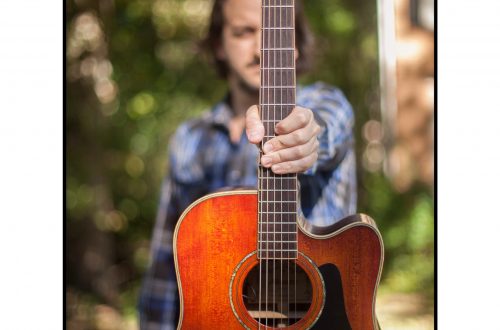
Mark Grundhoefer – IndieView 13th
Febbraio 1, 2019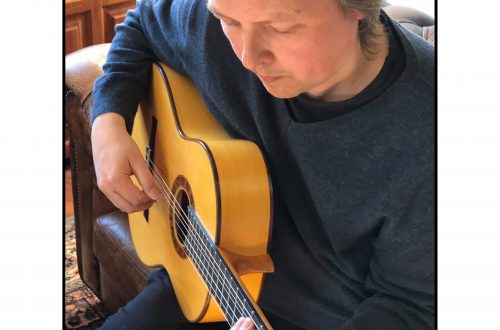
Tommy Berre – IndieView #7
Agosto 20, 2018